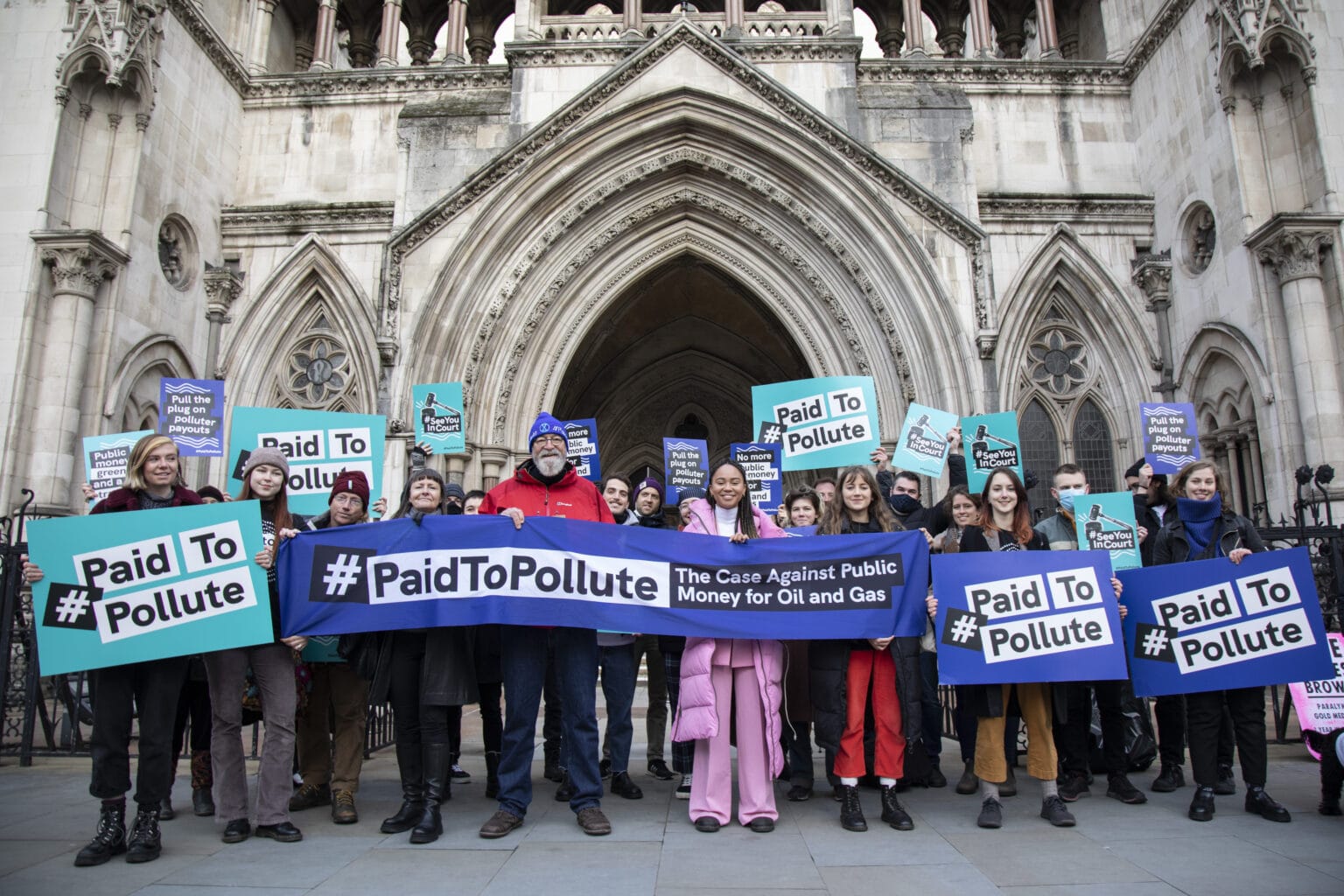The UK government is not legally required to consider tax breaks to oil and gas companies or emissions from burning fossil fuels when regulating the North Sea sector, a court has ruled today, rejecting a complaint by climate campaigners.
At a judicial review hearing in December at the Royal Courts of Justice in London, campaigners argued that the Oil and Gas Authority (OGA) strategy was “unlawful” because it fails to take into account tax breaks for oil and gas companies when approving new projects.
They also argued that it is not consistent with the government’s legal commitment to cut greenhouse gas emissions to net zero by 2050. The case was brought against OGA and Kwasi Kwarteng, the Secretary of State for Business, Energy and Industrial Strategy (BEIS), OGA’s sole shareholder.
But the complaint was dismissed by the court in a judgment published today, which ruled that tax relief for oil and gas companies did not amount to a subsidy, and that the OGA does not have a duty or the power to regulate “scope 3” emissions – those produced when oil and gas are burned. It said not taking into account these tax breaks or regulating “indirect” emissions was consistent with the UK’s climate change goals.
The case is part of the growing trend of courts being used to challenge governments and companies over climate action and fossil fuel extraction. The judgment follows Shell’s abandoning of the Cambo North Sea project last month, putting the future of the development in doubt. A consultation on a new “Climate Compatibility Checkpoint” for future oil and gas licences was launched in December.
‘Strained and Nonsensical’
In her judgment, Mrs Justice Cockerill acknowledged that in some years oil and gas companies had paid less in taxes than they received in tax breaks. She wrote: “The claimants point to clear evidence of negative taxation flows in particular years; specifically negative tax flows overall in 2015-16 and 2016-17 of £2 million and £359 million respectively.”
But she said focussing on single years ignored the fact that “the tax position over the life of the concession is at worst neutral”, and claimed that pointing to single years was a “strained and nonsensical approach”.
Mrs Justice Cockerill also concluded: “There is nothing legally erroneous when OGA says it does not regulate the sector as regards transport and electricity and that it could not stop scope 3 emissions.”
She cited a landmark case from September, brought by Greenpeace against BP, as authority for saying there is “no duty on the OGA to take into account” scope 3 emissions.
The judicial review was brought by medical student Mikaela Loach, an organiser with Scottish environmental think tank Common Weal Kairin van Sweeden, and former oil refinery worker Jeremy Cox. The case was backeded by environmental non-profit Uplift, which coordinates the Paid to Pollute campaign, whose supporters include Greenpeace UK, Friends of the Earth Scotland and 350.org.
Jeremy Cox said:“This judgment exposes the absurdity of North Sea oil and gas, where those in government responsible for tackling climate change are able to ignore how taxpayer money is used to prop up the industry.
“We still believe that, in doing so, the Oil & Gas Authority has acted unlawfully by ignoring tax subsidies when approving new fossil fuel projects and we are seeking legal advice on an appeal.”
In a joint statement the claimants said: “Today the High Court ruled against us, but accepted that the UK’s Oil and Gas Authority can ignore the billions of pounds in public money that prop up oil and gas companies when deciding whether or not to approve oil and gas extraction.”
Paid to Pollute claims oil and gas companies have received billions in tax relief and towards the costs of decommissioning projects since the Paris Agreement. The government disputes this, and “billions” does not appear in today’s judgment.
‘Unacceptable’ Fossil Fuel Subsidies
The statement continued: “The Court also accepted that oil and gas companies may receive more pay-outs in public money than they pay in tax. While the Court did not think this is unlawful, we think this is completely unacceptable in a time of bumper profits for oil and gas companies and during a climate emergency.
“The court may not have agreed with the legal arguments, but the costs of subsidising oil and gas production are now a matter of the public record.”
The claimants said they would decide on whether to appeal “over the next few days”. Rowan Smith, a solicitor at Leigh Day representing the claimants, said: “We are advising our clients on the potential for making an application to the Court of Appeal.”
The joint statement added: “Regardless of what we decide, the billions that the UK government has wasted propping up the oil and gas industry have finally been made public. There is no going back. The fight to stop the flow of public money to oil and gas companies is just getting started.”
A BEIS spokesperson said: “We welcome today’s judgment. While we are gradually driving down demand for fossil fuels, there will continue to be ongoing demand for oil and gas over the coming years as we transition to lower carbon, more secure forms of energy generated in this country.
“We cannot have a ‘cliff edge’ by turning off our domestic source of gas overnight, as acknowledged by the independent Climate Change Committee, which would put energy security, British jobs and industries at risk and make us even more dependent on foreign imports.”
An OGA spokesperson said: “We welcome the judgment. We remain firmly focused on regulating and influencing the oil, gas and carbon storage industries to both secure energy supply and support the transition to net zero.”
The decision was also welcomed by industry body Oil and Gas UK, whose Chief Executive, Deirdre Michie, said: “We hope this decision strengthens investment confidence in the UK basin at a time when we [need] to prioritise domestic energy production while delivering a lower carbon energy future.
“We will continue to improve and scale up those greener solutions. However we cannot switch overnight, so it is vital we can continue to produce the oil and gas that is needed to avoid the lights going [out] as we make the transition to that diverse mix of lower carbon energies that will help get us to net zero.”
Subscribe to our newsletter
Stay up to date with DeSmog news and alerts







